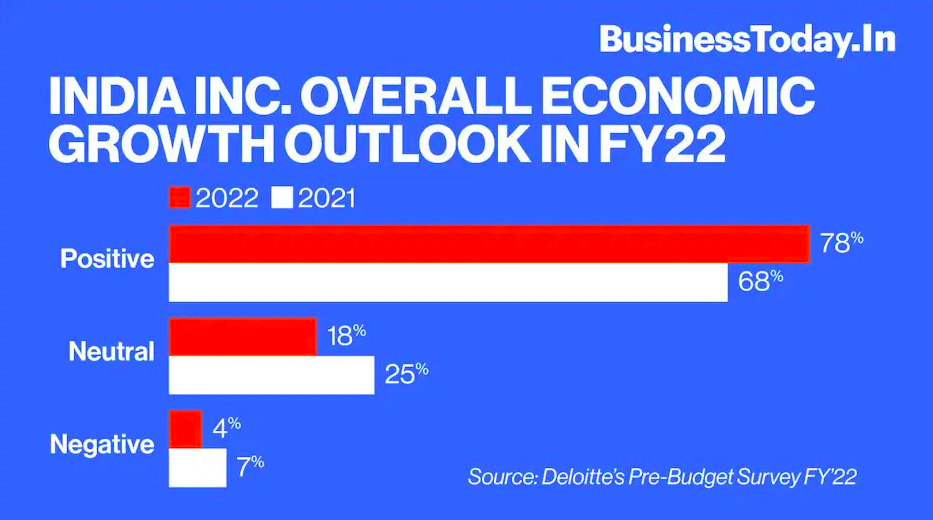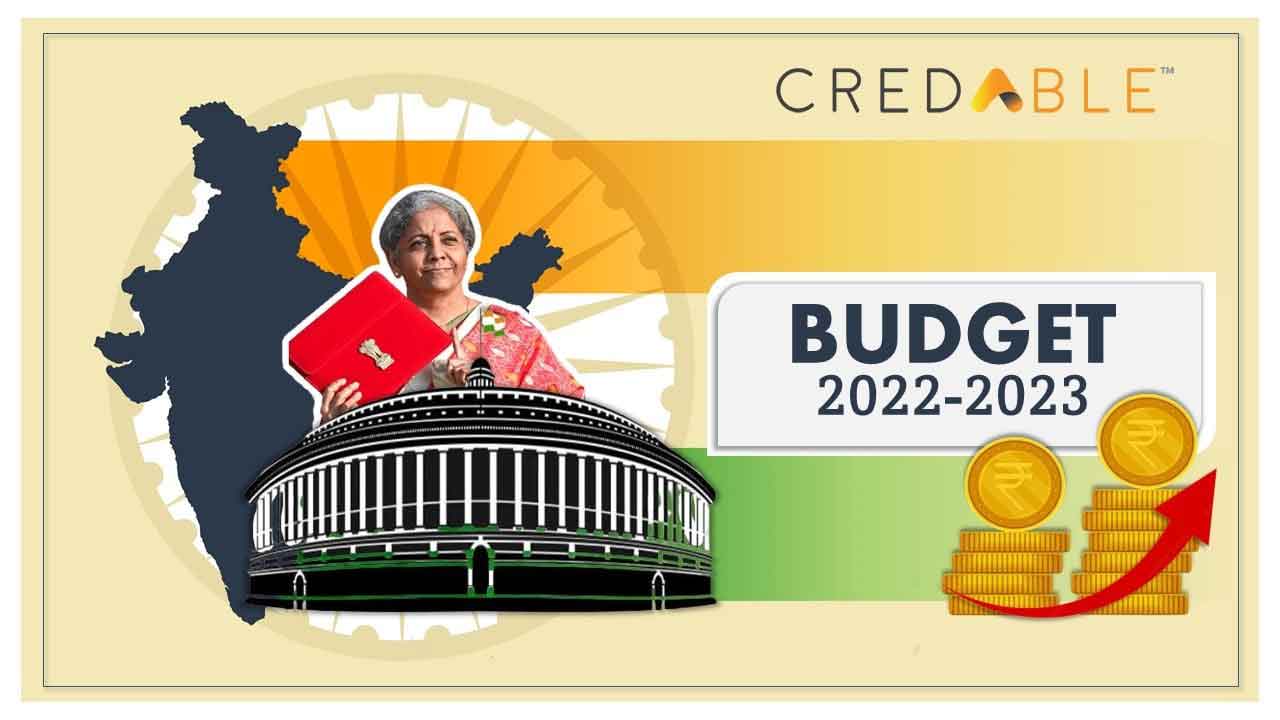Budget Highlights: Budget 2022-2023 to set India on the Accelerated Growth Path
Amid continued disruption from the pandemic and rising inflation concerns, the Union Budget 2022-2023 was unveiled today by the Finance Minister, Nirmala Sitharaman.
Going by the popular opinion, the Finance Minister has delivered a realistic but not a very populistic budget.
It appears to be a well-balanced budget that is promising to provide a much-needed stimulus to the economy in the coming months.
According to a pre-budget survey by Deloitte, 75% of India Inc. were positive about the recovery of the Indian economy.

With plans to inject funding to key areas of the Indian economy, like the MSME segment, Budget 2022 looks like it will live up to the expectations and propel the economy on a higher growth trajectory when compared to 2020 & 2021.
The finance minister made a strong point when she stated that the Union Budget 2022-23 will lay the groundwork for India’s growth and expansion in the coming 25 years.
Overview of the Union Budget 2022-2023
In the aftermath of the pandemic, India has out beaten world economies to record a significant recovery from the economic slump inflicted by the COVID-19. In fact, looking back, India has retained this title of quick economic expansion for the last three years.

With hopes of reaping benefits from the continued economic expansion, the government has doubled down on its proposed capital expenditure.
While the government’s pro-growth budget reveals a long-term vision for inclusive development, the middle-class taxpayers seem to be left in a lurch again.
The salaried employees had no privileges coming their way with respect to lowering the income tax slab rates. This is despite the demand for relief in some form, owing to the staggering effects of the pandemic and the extended lockdowns on various sectors of the economy.
While many of the Budget’s proposed policy reforms spelt out growth, the announcement that RBI will be issuing the ‘Digital Rupee’ in Fiscal 2022-23 using Blockchain technology, came as the big news.
The roll-out of digital currency will be a massive impetus that will drive the growth of the digital economy by leveraging blockchain technology. This is undoubtedly the right move considering how the payments space has evolved. The Digital Rupee is only going to give the economy a knee-jerk action to propel growth.
The government also solidifies its plans to generate more employment opportunities by announcing that 60 lakh jobs will be created in the next five years. This is a welcome change, especially to the young graduates and those who have lost their jobs during the pandemic years of 2020 and 2021.
Sector-wise key highlights of Union Budget 2022-2023
The Finance Minister in her speech said that this budget’s measures will be most beneficial to the country’s women, youth, farmers, as well as public and private investment.
Here’s a look at the key reforms announced for various sectors:
Overall economy:
- The budget which was primarily growth-oriented has hiked the outlay for capital expenditure by a whopping 35.4% with the effective capital expenditure of the center proposed to be nearly 10.7 Lakh crore.

- PM Gati Shakti, Financing of investments, Sunrise Opportunities, Inclusive Development, Energy Transition, Climate Action and Productivity Enhancement, will be the primary areas of focus for this budget.
- Productivity-linked incentive schemes being introduced in 14 sectors have received much backing with proposed investments worth Rs 30 lakh crore.
Tax reforms:
- The government proposes a stable tax regime with the surcharge on long-term capital gains capped at 15%.
- Income from digital assets will be taxed at 30%.
- For state government employees, the tax deduction limit has been increased to 14% on employee contribution to their NPS accounts.
- In the case of ommissions in ITR, taxpayers are now allowed to update returns within 2 years.
- For co-operative societies, the minimum tax slab has been cut to 15%.
Startups:
- The tax incentives that were offered to the startups on redemption of taxes for 3 consecutive years will be extended for one more year.
- An expert committee to propose measures to help attract investments will be set up.
- Startups will also be promoted for the proposed Drone Shakti program.
MSMEs:

- With the introduction of the Raising and Accelerating MSME Performance (RAMP) initiative, the government plans to shell out a Rs 6,000 crore programme to rate MSMEs over the course of the next 5 years. This will be a step in the right direction to revive the sector that is currently plagued with financial constraints.
- The one station, one product scheme will have over 100 PM Gati Shakti Cargo terminals to be set up in the next 3 years. This will be done with an aim to further strengthen the local supply chains via the country’s wide rail network.
- The other add-on is that the Emergency Credit Line Guarantee Scheme (ECLGS) will be extended till March 2023. The hospitality and travel sector has been heavily impacted by the pandemic. In a move to revive MSMEs in this sector and other related enterprises, the government has announced an additional allocation of Rs. 50,000 crores under the ECLGS scheme. This further takes up the total guarantee cover to Rs. 5,00,000 crores.
- MSME portals like Udyam, e-Shram, NCS and Aseem will be interlinked with a view to widening their scope. This will improve entrepreneurship opportunities and improve credit facilitation for MSMEs.
- Additionally, to curb the economic distress brought on by the COVID-19 pandemic, the government has announced its plans to revamp the Credit Guarantee Trust for Micro and Small Enterprises (CGTMSE) scheme and infuse more funds into the MSME sector. This move will lead to enabling an additional credit of ₹2 lakh crore for MSMEs.
- In Budget 2022, the government announced its plans to enable digital upskilling. Considering the MSME sector’s need for digitisation, the government’s plan to set up a digital ecosystem comes as a timely measure.
Financial inclusion and investments:
- In an effort to promote digital payments, the government has announced that 75 digital banks will be established in 75 districts by scheduled commercial banks.
- Rs. 1 Lakh crore will be provided as financial aid to state governments.
- Surety bonds will be accepted in place of bank guarantees in government procurements.
Agriculture:
- The government has proposed to introduce digitisation in the agricultural sector with a plan to use Kisan Drones for crop assessment and the tedious task of spraying insecticides.
- Appropriate financial aid will be provided to farmers who plan to take up agroforestry.
- A co-investment model fund will be set up through NABARD to provide financial support to startups for agriculture.
Healthcare:
- National Tele Mental Health Program will be launched for mental health counselling.
- The national digital health ecosystem platform will be set up to provide universal access to health products.
Telecom:
- The roll-out of 5G mobile services in FY 2022-23 by private firms was one of the major plans that were announced in Union Budget 2022-2023. This will greatly accelerate India’s move towards becoming a digital economy.
- Contracts to lay optical fibre in rural areas will be introduced with an aim to target completion by 2025.
Other key reforms:
- The Indian government will soon launch the next phase of Ease of Doing Business EODB 2.0 and Ease of Living.
- With a goal to promote self-reliance in the defence sector, the government has earmarked 68% of the capital in this sector for the local industries.
Wrapping up
With the roll-out of Union Budget 2022-2023, one thing is certain — after bouncing back strongly from the impact of the pandemic, the government is now highly-focused on steering the nation towards a sustainable future.
The government has done a fair job in covering a vast gamut of sectors and addressing key areas to fuel the next phase of growth for India. We strongly believe that the budget will provide a tremendous stimulus to the economy, especially in ensuring working capital financing for key segments of the Indian economy.
